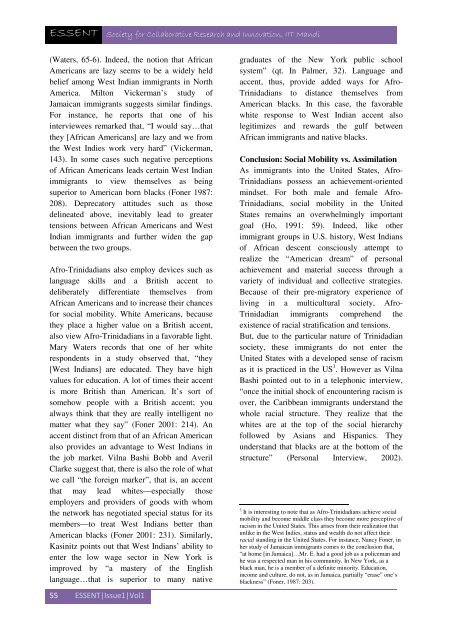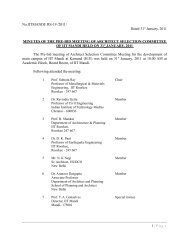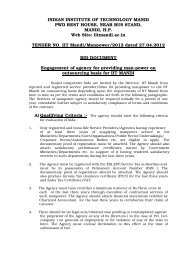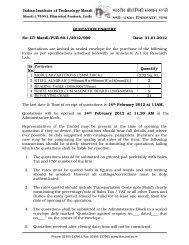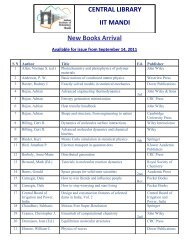Issue1. Vol.1 (April, 2013) - IIT Mandi
Issue1. Vol.1 (April, 2013) - IIT Mandi
Issue1. Vol.1 (April, 2013) - IIT Mandi
- No tags were found...
Create successful ePaper yourself
Turn your PDF publications into a flip-book with our unique Google optimized e-Paper software.
ESSENT Society for Collaborative Research and Innovation, <strong>IIT</strong> <strong>Mandi</strong>(Waters, 65-6). Indeed, the notion that AfricanAmericans are lazy seems to be a widely heldbelief among West Indian immigrants in NorthAmerica. Milton Vickerman’s study ofJamaican immigrants suggests similar findings.For instance, he reports that one of hisinterviewees remarked that, “I would say…thatthey [African Americans] are lazy and we fromthe West Indies work very hard” (Vickerman,143). In some cases such negative perceptionsof African Americans leads certain West Indianimmigrants to view themselves as beingsuperior to American born blacks (Foner 1987:208). Deprecatory attitudes such as thosedelineated above, inevitably lead to greatertensions between African Americans and WestIndian immigrants and further widen the gapbetween the two groups.Afro-Trinidadians also employ devices such aslanguage skills and a British accent todeliberately differentiate themselves fromAfrican Americans and to increase their chancesfor social mobility. White Americans, becausethey place a higher value on a British accent,also view Afro-Trinidadians in a favorable light.Mary Waters records that one of her whiterespondents in a study observed that, “they[West Indians] are educated. They have highvalues for education. A lot of times their accentis more British than American. It’s sort ofsomehow people with a British accent; youalways think that they are really intelligent nomatter what they say” (Foner 2001: 214). Anaccent distinct from that of an African Americanalso provides an advantage to West Indians inthe job market. Vilna Bashi Bobb and AverilClarke suggest that, there is also the role of whatwe call “the foreign marker”, that is, an accentthat may lead whites—especially thoseemployers and providers of goods with whomthe network has negotiated special status for itsmembers—to treat West Indians better thanAmerican blacks (Foner 2001: 231). Similarly,Kasinitz points out that West Indians’ ability toenter the low wage sector in New York isimproved by “a mastery of the Englishlanguage…that is superior to many native55 ESSENT|Issue1|Vol1graduates of the New York public schoolsystem” (qt. In Palmer, 32). Language andaccent, thus, provide added ways for Afro-Trinidadians to distance themselves fromAmerican blacks. In this case, the favorablewhite response to West Indian accent alsolegitimizes and rewards the gulf betweenAfrican immigrants and native blacks.Conclusion: Social Mobility vs. AssimilationAs immigrants into the United States, Afro-Trinidadians possess an achievement-orientedmindset. For both male and female Afro-Trinidadians, social mobility in the UnitedStates remains an overwhelmingly importantgoal (Ho, 1991: 59). Indeed, like otherimmigrant groups in U.S. history, West Indiansof African descent consciously attempt torealize the “American dream” of personalachievement and material success through avariety of individual and collective strategies.Because of their pre-migratory experience ofliving in a multicultural society, Afro-Trinidadian immigrants comprehend theexistence of racial stratification and tensions.But, due to the particular nature of Trinidadiansociety, these immigrants do not enter theUnited States with a developed sense of racismas it is practiced in the US 3 . However as VilnaBashi pointed out to in a telephonic interview,“once the initial shock of encountering racism isover, the Caribbean immigrants understand thewhole racial structure. They realize that thewhites are at the top of the social hierarchyfollowed by Asians and Hispanics. Theyunderstand that blacks are at the bottom of thestructure” (Personal Interview, 2002).3 It is interesting to note that as Afro-Trinidadians achieve socialmobility and become middle class they become more perceptive ofracism in the United States. This arises from their realization thatunlike in the West Indies, status and wealth do not affect theirracial standing in the United States. For instance, Nancy Foner, inher study of Jamaican immigrants comes to the conclusion that,“at home [in Jamaica]…Mr. E. had a good job as a policeman andhe was a respected man in his community. In New York, as ablack man, he is a member of a definite minority. Education,income and culture, do not, as in Jamaica, partially “erase” one’sblackness” (Foner, 1987: 203).


